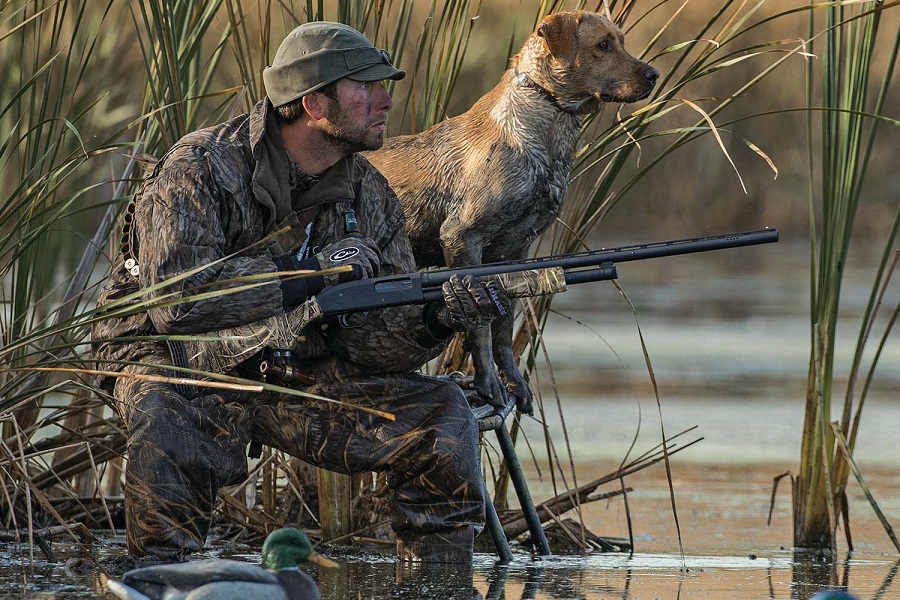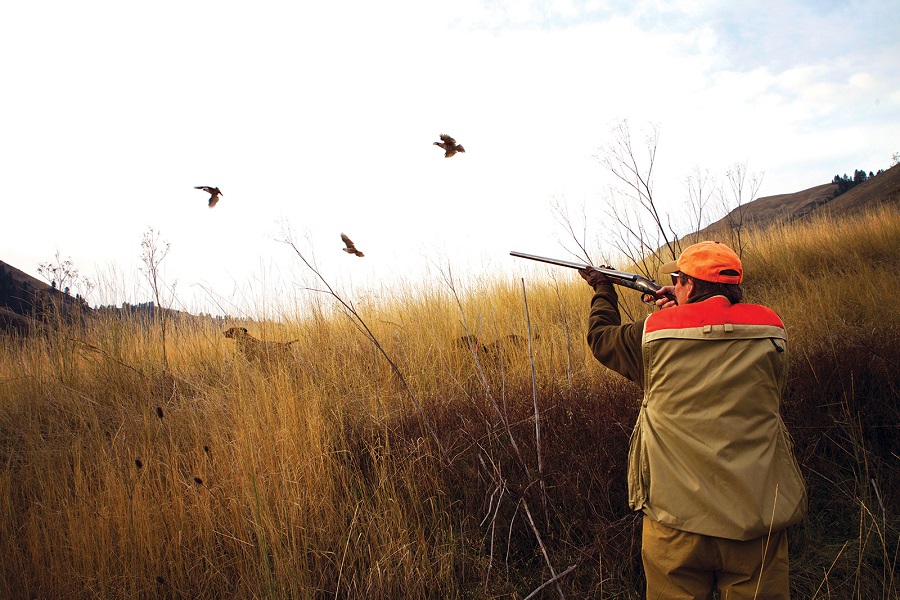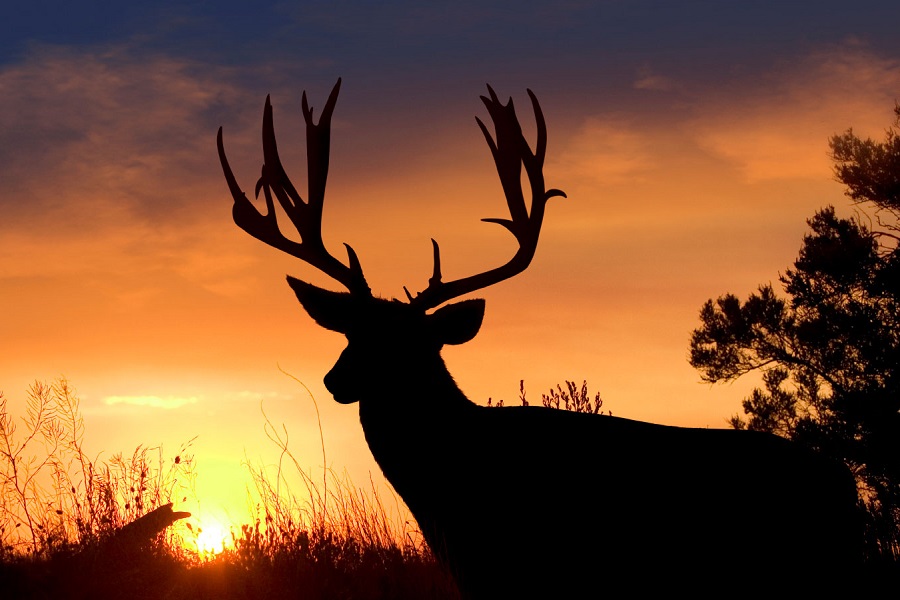Hunting regulations: the laws that keep the fine balance of ecosystem life and the health of your wallet in check.
The amount you could end up paying in fines is astronomical, and not complying with state and federal regulations on hunting could result in the suspension of your hunting license or permanent bans in specific states and territories.
It’s a big deal, so let’s take a look at what these regulations are, why they’re here, and how to follow them so you can hunt in peace.
Hunting Regulations In The United States

It’s time for a crash course on hunting regulations. The United States may be one country, but every state has polarising laws surrounding hunting.
We’ll get into those later, but for now, let’s talk about what you need to look out for.
Weapon Licences
An unregistered weapon is one of the worst things you can possibly own. Each state has its own laws on gun ownership, but as long as you’re licensed to use your gun appropriately in each state, you’ll be okay to bring it along.
Just be sure that all necessary documentation is easy to reach in the event that you are pulled over or need to supply proof of ownership and registration to park rangers or officials.
Knife Length Requirements
Hunting knives are an essential part of your kit. However, you don’t want to be caught with a knife that’s too long for the state you’re in. Each state will have its own guidelines on length, concealment, opening (spring-loaded versus flip opening, etc.), and whether serrated edges are allowed.
If you’re traveling from Washington state to Michigan, you want to make sure your knife falls in line with both state laws and the laws of each state you will be passing through, in the off chance that you are pulled over and police decide to search your vehicle.
Park rangers can also check your equipment before you go into a forest for hunting.
Hunting Off-Season
This is prohibited, and you could receive major fines if you don’t abide by the season dates. Some states have an open season, which attracts a lot of hunters year-round who have tight seasons in their home state.
There’s a chance that you could lose your license for the foreseeable future or be banned from hunting in a state altogether if you do not abide by seasonal hunting guidelines.
They are put in place to preserve an ecosystem with a hefty wildlife population and keep things in check.
Small game and whitetail deer contribute to the food chain in any forest or wildlife scenario. That being said, they can overpopulate, which is why some states will call for certain seasons to be extended if the deer population is too large.
Their excrement can kill plant life and make certain areas unlivable for other animals, whereas small game can endanger the balance of predator versus prey in some areas.
All About IHEA Hunter Orange Laws

This is a separate regulation that also incurs fines (the list builds up quickly, doesn’t it?). You need a certain amount of IHEA-certified orange on your clothing at all times while hunting.
This is put in place to avoid accidents, make you easily visible to other hunters and officials, and, in the event of injury where a search party would be required, light will reflect off of your clothing and aid in your survival.
Every state has different laws on hunter orange. Alaska, for some reason, does not have any requirements for it, but in Alabama, you must have at least 144 square inches of hunter orange on you while hunting.
Even when it is not required to wear it, it is strongly recommended since you will be in an environment with other hunters. The thicker the foliage is and the more narrow the hunting seasons are, the higher your chance is of encountering other hunters and potential accidents.
States like Georgia require upwards of 500 square inches of visible hunter orange, and then you run into other states that have longer seasons and more game, like Texas, and those only require 144 square inches. It’s important and something to keep an eye on when you’re buying hunting gear.
How to Get a Hunting Licence in the United States
Depending on what state you’re in, it could be as easy as filling out your information and purchasing the license. Texas is a big hunting state, and they have one of the easiest ways to get a hunting license.
The catch is that they’re expecting you to adequately read their own hunting regulations, license agreements, and commercial information. There’s a lot of information available that you need to go over and evaluate before you go through with purchasing a license.
Before applying for or purchasing a license, you need to understand what is off-limits, what the seasons are, and what’s fair game. Every state is different. Some states, like Arkansas, have extremely high populations of deer, which can be a problem for the ecosystem.
They have longer deer hunting seasons than other states, so you can get more out of your license. Each state resource will have information on their hunting seasons and fines for operating outside of them as well.
Once you read all of the preliminary information, you have to apply. These application processes can be simple, and some automatic verification systems can identify your SSN and address and automatically approve you.
Other processes are still approved manually and might require 2-3 weeks before you get an answer and another 5–6 weeks before the license actually reaches you.
Altogether, that’s a little over two months, worst-case scenario. It’s important to prepare for your hunting license well before you believe it’s necessary.
Timeline Of Most Hunting Seasons In The United States
You can only really display this by state to get an accurate depiction.
While hunting seasons change from year to year, this is a good jumping-off point for what you can expect from your state and the states that you hunt in when it comes to appropriate hunting seasons.
- Alabama: October 15th through November 16th; stipulations apply for firearms, archery, dog hunting, spearing, air rifles, and muzzleloaders.
- Alaska: September 1st through June 30th; black bear, brown bear, and grizzly bears; wolverines, hares, pikas, grouse, and crow times are limited; pheasant, quail, and wild turkey are open season.
- Arizona: October 25th through December 31st; stipulations apply for archery, muzzleloaders, CHAMP, and youth-only seasons.
- Arkansas: September 28th through November 30th; stipulations apply for archery, muzzleloaders, modern guns, and youth modern guns.
- California: August 10th through October 27th; stipulations apply for archery and the general season; Small game seasons may extend up to March 15th for rabbits, tree squirrels, and hares.
- Colorado: August 31st through October 14th; stipulations apply for pronghorn, plains deer, moose, and elk seasons.
- Connecticut: September 15th through December 24th; stipulations apply for firearms, archery, and muzzleloaders; small game seasons generally begin on January 1st and last through February 28th, resuming in the big game season.
- Delaware: September 1st through December 22nd; stipulations apply for handguns, shotguns, archery, crossbows, and youth and disability hunts; Public land permits range from April 11th through May 9th.
- Florida: August 2nd through March 1st; stipulations apply for firearms, crossbows, archery, and muzzleloaders; turkey seasons specifically run through the end of April, as south Florida is abundant with wild turkey.
- Georgia: September 14th through January 12th; stipulations apply for primitive weapons, firearms, archery, and bear seasons.
- Hawaii: year-round feral pig, feral goat, and black-tailed deer hunting season on Kauai; year-round feral pig and feral goat hunting season on Oahu; year-round hunting seasons on Molokai, Maui, and the island of Hawaii for various animals
- Idaho: September 6th through December 20th; stipulations apply for deer and elk seasons; small game seasons run from February 28th through December 31st for various game
- Illinois: October 1st through February 28th for various game types; stipulations apply for archery, muzzleloaders, firearms, and CWD.
- Indiana: September 15th through January 5th; stipulations apply for archery, firearms, muzzleloaders, and antlerless special seasons; Small game seasons can stretch from August 15th through March 31st in some years.
- Iowa: September 21st through January 26th; stipulations apply for archery, youth, disabled hunters, non-resident holiday seasons, and early muzzleloaders; Turkey seasons vary depending on population.
- Kansas: September 16th through January 12th; stipulations apply for general firearms, archery, muzzleloaders, pre-rut antlerless deer, general youth, and disabled hunters.
- Kentucky: September 7th through December 29th; stipulations apply for archery, crossbows, muzzleloaders, modern guns, and youth-only guns.
- Louisiana: September to January for archery; October to January for muzzleloaders and firearms without dogs; December to January for firearms with or without dogs.
- Maine: November 2nd through December 14th; stipulations apply for archery, firearms, and resident-only hunting; bear and moose seasons vary per year.
- Maryland: September 6th through January 4th; stipulations apply for firearms, archery, and muzzleloaders; Small game season may extend from November 2nd to March 15th for crow, pheasant, quail, rabbit, and more.
- Massachusetts: December 2nd through December 31st for shotguns and primitive firearms; September 28th through November 2nd for youth and paraplegic hunts
- Michigan: September 21st through January 19th; stipulations apply for regular firearms, muzzleloaders, and elk seasons.
- Minnesota: September 14th through February 29th; stipulations apply for wild turkey, bears, bobcats, small game, deer, archery, firearms, and youth hunts.
- Mississippi: October 1st through February 15th for deer season; stipulations apply for youth guns, archery, firearms, and primitive weapons; Wild turkey seasons can range from October 15th to May 1st; small game seasons are from October 13th through September 30th for various game.
- Missouri: November 2nd through January 15th; stipulations apply for archery, firearms, and youth firearms; small game seasons may run from May 25th through November 9th for quail, woodcock, opossum, fox, dove, crow, coyote, and squirrel, among other local game.
- Montana: August 15th through June 15th; those seasons apply to black bears, bison, bighorn sheep, and antelope, each with their own seasons.
- Nebraska: September 1st through January 15th for deer season; stipulations apply for muzzleloaders, archery, and firearms; antelope, elk, and wild turkey seasons can range anywhere from August 20th through January 31st.
- Nevada: August 22nd to October 4th for antelope; August 16th through January 5th for elk; goat, sheep, deer, and wild turkey seasons vary from August 10th through January 5th.
- New Hampshire: September 15th through October 28th; stipulations apply for archery, muzzleloaders, firearms, and youth weekends; small game seasons generally run from October 1st to March 31st.
- New Jersey: September 22nd through December 15th; stipulations apply for firearms, archery, muzzleloaders, black bear, and deer seasons; wild turkey seasons run from April through November.
- New Mexico: September 1st through December 1st for general deer season; elk season runs September 1st through January 31st.
- New York: September 27th through December 31st; stipulations apply for firearms, archery, crossbows, and muzzleloading; black bear and wild turkey seasons can run from October 12th through May 31st, depending on the population.
- North Carolina: October 13th through January 1st for black bears; deer season runs from September 22nd through January 1st.
- North Dakota: November 1st through December 31st for bighorn sheep and elk season; moose season runs from September 6th through November 3rd.
- Ohio: September 28th through May 31st for deer and wild turkey; stipulations apply for archery, firearms, muzzleloaders, and youth hunts.
- Oklahoma: October 1st through May 6th for wild turkey, antelope, small game, deer, elk, and bear; stipulations apply for archery, muzzleloaders, firearms, youth hunts, and holiday antlerless hunting.
- Oregon: August 1st through December 31st for black bear and cougar seasons; deer, elk, small game, and pronghorns have a mix of open seasons and August-September seasons.
- Pennsylvania: September 29th through October 20th for deer season; stipulations apply for archery, crossbows, muzzleloaders, and firearms; elk, black bear, wild turkey, and small game seasons vary from October 13th to November 21st.
- Rhode Island: September 15th through December 16th for deer season; stipulations apply for archery, muzzleloaders, and firearms; small game seasons run from September 15th through February 28th, with no open seasons on private land for coyotes and a closed season for ruffed grouse.
- South Carolina: October 1st through January 5th; South Carolina is subject to changing their hunting seasons a lot, so take this with a grain of salt.
- South Dakota: August 18th through January 20th; stipulations apply for landowners, archery, firearms, youth hunting, muzzleloaders, elk, and deer.
- Tennessee: September 22nd through May 12th for turkey, deer, and small game seasons; open season for armadillo, beaver, coyote, striped skunk, and groundhog; stipulations apply for archery and muzzleloaders.
- Texas: September 29th through February 3rd for deer; archery, muzzleloaders, and general season stipulations apply; alligator, mule, wild turkey, pronghorn, small game, and javelina seasons vary between September 10th and May 12th depending on the game.
- Utah: August 18th through October 28th for wild deer; stipulations apply for archery, muzzleloaders, and early seasons.
- Vermont: October 5th through December 15th for deer; stipulations apply for rifles, muzzleloaders, archery, and youth weekend hunting; small game season lasts from September 1st through December 31st, with quail being open season.
- Virginia: October 13th through January 5th for bear; stipulations apply for archery, early firearms, muzzleloaders, and youth hunting; small game seasons run from August 18th through June 15th, with groundhogs being open season.
- Washington: October 13th through December 15th for deer; stipulations apply for archery, firearms, muzzleloaders, disabled and senior hunters, and youth hunting; Small game seasons exclusively run from September 1st through March 15th for crow, grouse, rabbit, fox, bobcat, and raccoon, with coyote being open season.
- West Virginia: September 29th through February 3rd for boar; small game seasons run from September 8th through February 28th.
- Wisconsin: September 15th through January 1st; stipulations apply for holiday hunting, firearms, disabled hunters, archery, crossbows, and youth deer.
- Wyoming: October 10th through November 20th for antelope, with elk being from October 15th through January 21st.
The seasons are subject to change without notice. This information was drawn directly from official sources that fluctuate based on the animal population, state laws, hunting accident percentages, and additional information that may not be available to the public (internal reports, investigations, and decisions on a statewide level).
To stay up-to-date on information for hunting seasons, you can also visit Hunting Season HQ and use their interactive map for further in-depth information on your home and target states regarding hunting seasons.
Protocol Brings Peace

Following protocol not only maintains the balance of the ecosystems you’re entering and hunting in but also ensures you’re not going to hit any fines or face any short-term jail time.
Before you actually begin your hunting trip, keep an eye out for wildlife conservation centers and any local park ranger stations that could validate or verify the information for you.
Not everything you find online through independent research will be 100% perfect, but actually speaking to someone who enforces these laws will ensure total compliance on your part.
Resources:



